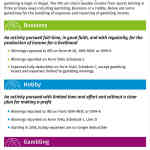Proposed Tax Legislation and Impact on 2022/2023 Tax Planning

Wolters Kluwer Tax & Accounting Takes a Look at the Congressional Tax Proposals that Could Affect Tax Planning for 2022 and 2023
–(BUSINESS WIRE)–#accounting–Wolters Kluwer Tax & Accounting:
What: Congress has been working on a number of tax proposals for 2022. While some tax proposals appear to have bipartisan support, Congress has primarily focused on trying to rescue at least part of last year’s Build Back Better bill, which requires the support of all Senate Democrats even if passed under budget reconciliation. This effort is ongoing, and an agreement has not yet been reached on several major provisions. Meanwhile, other tax legislation has been held up as negotiations on this package continue. If enacted, many of these tax proposals would impact 2023 tax planning, and some could still impact 2022 planning. Yet, with Congress scheduled to adjourn for fall elections in less than a month, time is running out to accomplish many of these objectives.
Why: With 2022 already over half over, it is important to monitor these tax developments for possible year-end tax planning and planning for 2023. Some of the pieces of tax legislation under consideration include:
- Build Back Better. Now reduced from a $3.5 trillion package last year to something closer to $2 trillion, a tentative agreement has been reached on negotiating drug pricing (subject to the Senate Parliamentarian approval as appropriate for a reconciliation package) and an expansion of the net investment income tax. Still under negotiation are provisions concerning climate change, infrastructure, child tax credits, elderly housing, electric vehicle subsidies, a corporate minimum tax, an AGI surtax, and international tax reforms. Senator Manchin opposes climate change provisions and corporate and individual tax increases. It is expected that if Build Back Better is passed, new provisions will not be effective until 2023.
- Tax Cuts and Jobs Act. Some of the provisions of the Tax Cut and Jobs Act enacted in 2017, such as immediate expensing of research and development expenses, 100 percent bonus depreciation, and calculating the interest expense deduction limitation, are scheduled to expire. Many in Congress would like to find a vehicle to extend these provisions.
- China Competition Legislation. Proposals to promote the domestic production of silicon chips and other manufacturing activity deemed important to the U.S. economy also has bipartisan support. Senate Minority Leader McConnell has indicated that he will try not to let it pass until Senate Democrats abandon their Build Back Better efforts.
- Companies doing business with Russia. There is also bipartisan support to deny tax benefits to U.S. companies continuing to do business with Russia after its invasion of Ukraine. This could end up as a revenue raiser to support provisions in Build Back Better.
- SECURE 2.0. One version of a second effort at reforming tax-favored requirement savings has passed the House, and a different version has passed out of the Senate Finance Committee. Even if the Senate passes the Senate Finance version, there are sufficient differences between the two versions that they probably cannot be worked out in a conference committee before the fall elections.
- American Rescue Plan credits. The Administration would like to extend the American Rescue Plan Act’s one-year enhancements to the Child Tax Credit and the Earned Income Tax Credit to 2022 and the enhancements to the Premium Tax Credit beyond 2022. It is not clear that they can survive in the Build Back Better negotiations.
- Expired tax provisions. Several regularly expiring tax provisions, such as the mortgage insurance premium deduction, the nonbusiness energy property credit, the fuel cell motor vehicle credit, the alternative fuel refueling property credit, the two-wheeled plug-in electric vehicle credit, and the health coverage tax credit, expired at the end of 2021. There could be an effort to retroactively extend these for 2022 if the appropriate tax vehicle emerges.
Who: Tax expert Mark Luscombe, JD, LL.M, CPA, is available to discuss tax law issues concerning these proposals, their prospects for passage, and the possible impact on tax planning.
Contact: To arrange interviews with Mark Luscombe or other state or federal tax experts from Wolters Kluwer Tax & Accounting on this or any other tax-related topics, please contact:
Contacts
KELLY DE CASTRO
614-288-5640
Kelly.deCastro@wolterskluwer.com

